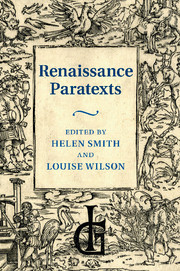Book contents
- Frontmatter
- Contents
- Figures
- Contributors
- Acknowledgements
- Introduction
- Part I Orders of the book
- Part II Making readers
- Chapter 5 Editorial pledges in early modern dramatic paratexts
- Chapter 6 Status anxiety and English Renaissance translation
- Chapter 7 Playful paratexts: the front matter of Anthony Munday’s Iberian romance translations
- Chapter 8 ‘Signifying, but not sounding’: gender and paratext in the complaint genre
- Part III Books and users
- Notes
- Select bibliography
- Index
Chapter 5 - Editorial pledges in early modern dramatic paratexts
Published online by Cambridge University Press: 05 August 2011
- Frontmatter
- Contents
- Figures
- Contributors
- Acknowledgements
- Introduction
- Part I Orders of the book
- Part II Making readers
- Chapter 5 Editorial pledges in early modern dramatic paratexts
- Chapter 6 Status anxiety and English Renaissance translation
- Chapter 7 Playful paratexts: the front matter of Anthony Munday’s Iberian romance translations
- Chapter 8 ‘Signifying, but not sounding’: gender and paratext in the complaint genre
- Part III Books and users
- Notes
- Select bibliography
- Index
Summary
In his survey of paratexts, Gérard Genette notes that ‘the publisher’s peritext’ may provide the ‘name . . . of the person(s) responsible for establishing the text and preparing the critical apparatus’ and will, on occasion, indicate the ‘number of printings, or “editions,” or “thousands”’ which the text has undergone. He does not, however, discuss the early modern practice of promising readers revised or ‘perfected’ content. Editorial pledges on the title-pages of early modern printed playbooks have never been granted sustained critical attention. This omission may be due to the fact that title-pages rarely refer to the preparation of dramatic copy for the press. A survey of the title-pages of the playbooks listed in Greg’s Bibliography of the English Printed Drama to the Restoration shows that only twenty-four out of 836 single editions, and seven out of forty-five collections, inform their readers about the quality, provenance, and reliability of the printer’s copy. Probably because statistically insignificant, this type of pledge is never taken to reflect established editorial practices and is often dismissed as an unfounded marketing ploy. In this chapter I show that editorial pledges often reflect print-house practice, and that, while they may retain a marketing function, they also direct the reader’s attention to a revised and improved text.
- Type
- Chapter
- Information
- Renaissance Paratexts , pp. 91 - 106Publisher: Cambridge University PressPrint publication year: 2011
- 3
- Cited by



